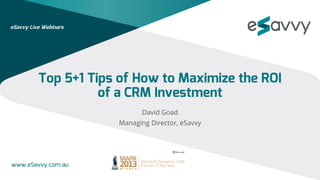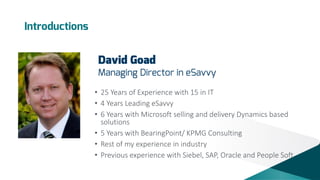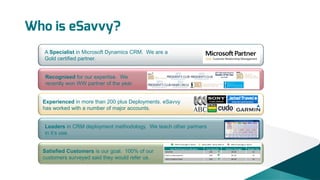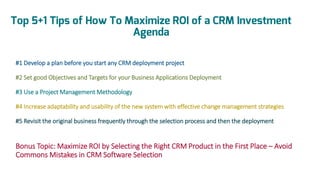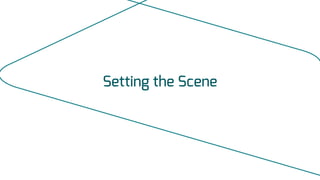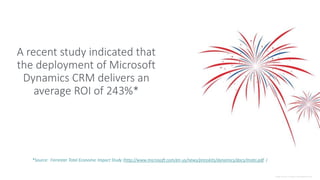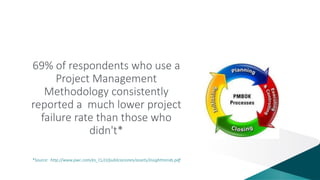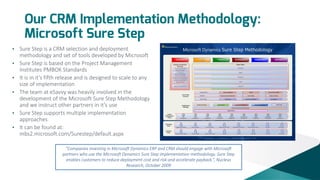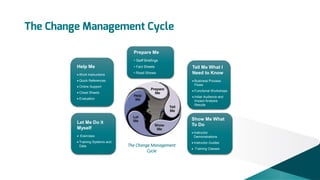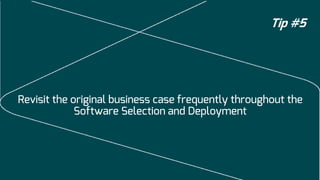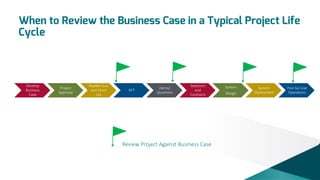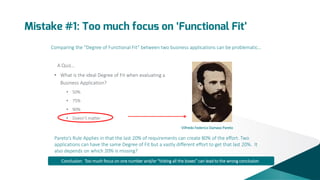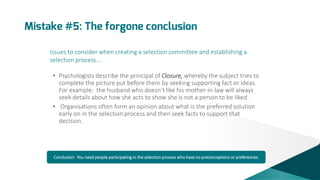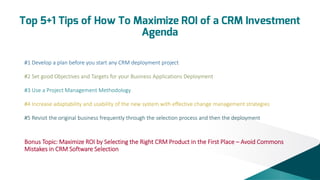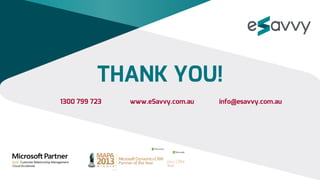eSavvy webinar: Top 5+1 Tips of How to Maximize the ROI of a CRM Investment
- 1. eSavvy Live Webinars Top 5+1 Tips of How to Maximize the ROI of a CRM Investment David Goad Managing Director, eSavvy www.eSavvy.com.au
- 2. Introductions David Goad Managing Director in eSavvy • 25 Years of Experience with 15 in IT • 4 Years Leading eSavvy • 6 Years with Microsoft selling and delivery Dynamics based solutions • 5 Years with BearingPoint/ KPMG Consulting • Rest of my experience in industry • Previous experience with Siebel, SAP, Oracle and People Soft
- 3. Who is eSavvy? A Specialist in Microsoft Dynamics CRM. We are a Gold certified partner. Recognised for our expertise. We recently won WW partner of the year. Experienced in more than 200 plus Deployments. eSavvy has worked with a number of major accounts. Leaders in CRM deployment methodology. We teach other partners in it’s use. Satisfied Customers is our goal. 100% of our customers surveyed said they would refer us.
- 4. Top 5+1 Tips of How To Maximize ROI of a CRM Investment Agenda #1 Develop a plan before you start any CRM deployment project #2 Set good Objectives and Targets for your Business Applications Deployment #3 Use a Project Management Methodology #4 Increase adaptability and usability of the new system with effective change management strategies #5 Revisit the original business frequently through the selection process and then the deployment Bonus Topic: Maximize ROI by Selecting the Right CRM Product in the First Place – Avoid Commons Mistakes in CRM Software Selection
- 6. A recent study indicated that the deployment of Microsoft Dynamics CRM delivers an average ROI of 243%* *Source: Forrester Total Economic Impact Study (http://www.microsoft.com/en-us/news/presskits/dynamics/docs/mstei.pdf ) "Image courtesy of Feelart/ FreeDigitalPhotos.net".
- 7. Yet some users of CRM systems will not get what they bargained for… "Image courtesy of stockimages / FreeDigitalPhotos.net".
- 8. Tip #1 Develop a plan before you start any CRM Selection or Deployment Process
- 9. Your Plan for the Software Selection Development of a successful software selection plan can be found by answering these basic questions ... • What is the software selection process? (RFT, Demo, POC) • Who needs to be involved? • Who will write the Business Case? • Who will write the Functionality Requirements derived from the Business Case? • How will you compare the software you are looking at against those requirements (analytical analysis, focus group)? • Who will approve the selection?
- 10. Your Plan for the Software Deployment Development of a successful software deployment plan can be found by answering some of these basic questions ... • Who will be involved? • How many phases? How long will the phases be? • Which department will go first? Which department will go last? • What tasks are you going to do internally? What are you asking a Systems Integrator to do? • Have you included Business Process Analysis and Design and User Acceptance Testing in your Plan? Who will do the training? Who will be responsible for these? • How will you manage the process change?
- 11. Tip #2 Set good objectives and targets for your business application based on real business value
- 12. Conduct “Conditions of Satisfaction Discussions” for Every Engagement What are Conditions of Satisfactions: • A high level discussion conducted at the beginning of the engagement with the project sponsor ship and the end • Business and Results Focused • Brief but well thought out (four or five well considered bullet points) • Revisited throughout the project particularly at the beginning and the end • Communicated throughout the project team What Conditions of Satisfaction are not: • A restatement of the SOW, WO or Functional Requirements • Technical or activity based • Discussed and then filed Conditions of Satisfaction Form
- 13. Tip #3 Use a Proven Project Management Methodology
- 14. 69% of respondents who use a Project Management Methodology consistently reported a much lower project failure rate than those who didn't* *Source: http://www.pwc.com/es_CL/cl/publicaciones/assets/insighttrends.pdf
- 15. Our CRM Implementation Methodology: Microsoft Sure Step • • • • • • Sure Step is a CRM selection and deployment methodology and set of tools developed by Microsoft Sure Step is based on the Project Management Institutes PMBOK Standards It is in it’s fifth release and is designed to scale to any size of implementation The team at eSavvy was heavily involved in the development of the Microsoft Sure Step Methodology and we instruct other partners in it’s use Sure Step supports multiple implementation approaches It can be found at: mbs2.microsoft.com/Surestep/default.aspx “Companies investing in Microsoft Dynamics ERP and CRM should engage with Microsoft partners who use the Microsoft Dynamics Sure Step implementation methodology. Sure Step enables customers to reduce deployment cost and risk and accelerate payback.”, Nucleus Research, October 2009
- 16. Tip #4 Increase adaptability and usability of the new system with effective change management strategies
- 17. The Change Management Cycle Prepare Me • Staff Briefings Help Me • Fact Sheets Work Instructions • Road Shows Quick References Business Process Flows Online Support Functional Workshops Cheat Sheets Initial Audience and Impact Analysis Results Evaluation Show Me What To Do Let Me Do it Myself Instructor Demonstrations Exercises Training Systems and Data Tell Me What I Need to Know The Change Management Cycle Instructor Guides Training Classes
- 18. Tip #5 Revisit the original business case frequently throughout the Software Selection and Deployment
- 19. When to Review the Business Case in a Typical Project Life Cycle Develop Business Case Project Approval Market Scan and Short List RFT Demo/ Questions Selection and Contracts Review Project Against Business Case System Design System Deployment Post Go-Live Operations
- 20. Bonus Tips Maximize ROI by Selecting the Right CRM Product in the First Place Avoid Common Mistakes in CRM Software Selection
- 21. Mistake #1: Too much focus on ‘Functional Fit’ Comparing the “Degree of Functional Fit” between two business applications can be problematic… A Quiz… • What is the ideal Degree of Fit when evaluating a Business Application? • 50% • 75% • 90% • Doesn’t matter Vilfredo Federico Damaso Pareto Pareto’s Rule Applies in that the last 20% of requirements can create 80% of the effort. Two applications can have the same Degree of Fit but a vastly different effort to get that last 20%. It also depends on which 20% is missing? Conclusion: Too much focus on one number and/or “ticking all the boxes” can lead to the wrong conclusion .
- 22. Mistake #2: Cost estimates based on limited information • Doing quality services estimation in ERP and CRM consulting is heavily impacted by the skill and experience of the estimator as well as the estimation tools they have at their disposal. • But even the best estimator with the best tools will still produce a poor quality estimate if they lack information and understanding of the client’s requirements or have made incorrect assumptions regarding… • the client’s resource capabilities; • preferred project plan; and • prioritisation of the project around other business activities. • It is fair to say then that the accuracy of a services estimate is proportional to the amount of information provided to and analysed by the consultant before providing the estimate. The relationship between information provided and accuracy of estimate Conclusion: The smart customer designs a process optimised to give potential vendors maximum information and exposure to your business.
- 23. Mistake #3: Comparing Apples and Oranges When comparing two vendor proposals you need to remember that… • Not all vendor proposals are done on the same or right assumptions • Factors that may affect the cost quoted by your systems integrator… • When the project will occur and how fast will it be completed • The number of phases in the delivery • How much you plan to do yourself • The level of documentation you expect • Another Serious Statistic : It is estimated that approximately 90% of enterprise system implementations are delivered late or over budget*. The likely explanation for this is that most companies don’t fully understand what the vendor is proposing. Conclusion: The selection process should make sure that all quotes and proposals are delivered on the same basis. There are many non-functional factors that may impact what an SI proposes. *Martin, M., 'An ERP Strategy', Fortune, 2 February 1998, pages 95–97.
- 24. Mistake #4: References but for what? In asking vendors for references… • A typical client seeks references showing the vendor has worked on similar deployments of a like solution • What they fail to recognise that the reference demonstrates that the company has done it before, but doesn’t demonstrate that the local consultants who will work on your project have done it before • Unless a consultancy can demonstrate multiple deployments of a similar solution in the same geographical area then the reference is meaningless Conclusion: Ask to see the consultants references and not the references of the consultancy.
- 25. Mistake #5: The forgone conclusion Issues to consider when creating a selection committee and establishing a selection process…. • Psychologists describe the principal of Closure, whereby the subject tries to complete the picture put before them by seeking supporting fact or ideas. For example: the husband who doesn’t like his mother-in-law will always seek details about how she acts to show she is not a person to be liked. • Organisations often form an opinion about what is the preferred solution early on in the selection process and then seek facts to support that decision. Conclusion: You need people participating in the selection process who have no preconceptions or preferences.
- 26. Mistake #6: Not understanding the business case before selecting a software package… In evaluating a Business Application you need to understand what is important to you and be careful about being “sold” to… • This is also known as “Shinny Hubcap Syndrome” • Being enticed into buying something you don’t really need just because it looks good • Beware of the Salesman utilising a “Flanking” or “Fragmenting” Strategy • Flanking: Changing the customers scope and requirements to fit the vendors product • Fragmenting: Convincing the customer to break the requirements up so that those that don’t fit the solution are deprioritised • It all comes back to understanding what functionality and capabilities will drive benefit for your business... Being able to answer the question “What features and functionality will really drive value for my business?” Conclusion: You need to set the objectives of your business application based on real business value.
- 27. Top 5+1 Tips of How To Maximize ROI of a CRM Investment Agenda #1 Develop a plan before you start any CRM deployment project #2 Set good Objectives and Targets for your Business Applications Deployment #3 Use a Project Management Methodology #4 Increase adaptability and usability of the new system with effective change management strategies #5 Revisit the original business frequently through the selection process and then the deployment Bonus Topic: Maximize ROI by Selecting the Right CRM Product in the First Place – Avoid Commons Mistakes in CRM Software Selection
- 28. Q&A Please write your question in the GTW Questions text area...
- 29. Please take a moment to fill out our 5-questions exit survey THANK YOU!
- 30. THANK YOU! 1300 799 723 www.eSavvy.com.au www.eSavvy.com.au info@esavvy.com.au
